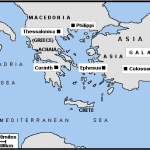An Unknown God
“I found …. an altar with the inscription, ‘To an unknown god.'” (Acts 17:23)
Paul’s visit to Athens was a little like Donald Trump’s visit to Arabia. He, too, was a stranger in a new world. Paul had been places before and Trump has been places before – but Paul had never been to Athens and Trump – who has traveled 500,000 miles in the last six years had never been to Riyadh or Rome or Jerusalem. He’s been the equivalent of 20 times around the world but never to a place of spiritual significance.
Trump has traveled to places with golf courses. Paul had traveled to places with  synagogues. Eventually both of them did something new.
synagogues. Eventually both of them did something new.
Actually Athens also had a synagogue and Paul went there first. But he went out to the market place as well and people said, “You ought to go to Mars Hill; you should go to the Areopagus.” Which was maybe a little like telling Donald Trump, “You’ve been to Dubai; you’ve played the golf courses. But to make a difference you need to go to Riyadh and Jerusalem and Rome. They said to Paul, “You’ve been to the synagogues, but what can you say to the pagan world?”
And obviously Paul had thought about it. He had grown up in the Greek world, not the Jewish world. He came from Tarsus in Turkey, not Jerusalem. He knew the Greek world and he thought he could talk to that world. He set out to do just that.
I think the passage we read as the first lesson this morning is one of the most fascinating passages in the Bible. It’s Paul’s first sermon to Gentiles and it shows us how he tried to shape his Jewish message for a Gentile world.
When I begin thinking about a sermon, I try to find a subject that everyone knows about, a point of commonality, something we’ve all been thinking about – like Donald Trump’s travels and travails. And then what I hope to do is see whether I can lead our thoughts from Trump to Paul, to the problems of Paul, because then we’re all on the same page. Otherwise I’ll be talking about Jesus and you’ll still have your minds on whatever you watched on television last night or checked out on your iPhone as you came in the door.
Paul was a preacher. He looked for those commonalities. He began to talk to the Athenians, about their city, not his. He began to talk about the shrines and  monuments they’d all seen, that they all knew about. “I’ve been wandering around your city,” he said. Well, everyone wants to know what visitors think of their city. People are always asking me, “How do you like California now that you’ve been here a few years. Have you seen the red woods? Have you seen the Japanese garden in Golden Gate Park?” And I ask them, “Have you seen the Prayer Book Cross in Golden Gate Park?” I’ve yet to meet anyone who’s been there.
monuments they’d all seen, that they all knew about. “I’ve been wandering around your city,” he said. Well, everyone wants to know what visitors think of their city. People are always asking me, “How do you like California now that you’ve been here a few years. Have you seen the red woods? Have you seen the Japanese garden in Golden Gate Park?” And I ask them, “Have you seen the Prayer Book Cross in Golden Gate Park?” I’ve yet to meet anyone who’s been there.
So Paul said, “I see you have lots of shrines. I see you are very religious, and I noticed one altar inscribed, ‘To the Unknown God.’” Apparently the Greeks had a shrine for every purpose – plus one: an insurance policy shrine, a shrine to any god we’ve left out: “To an Unknown God.” It gave Paul his opening: “I’m here,” he told them, “To tell you about the God you worship but don’t know.”
So now they were all on the same page – briefly – until Paul maybe went too far. He began with familiar sayings of Greek philosophers or, as he put it, “as some of your own poets have said . . .” He may be quoting Aratus, or maybe Epimenides. We’re not sure these days who wrote it or said it, but it was familiar stuff, quotations everyone knew. “We have things in common,” he was telling them, but he moved on quickly – maybe too quickly – to suggest that he knew something they didn’t know. “The God you ignorantly worship,” he told them, “has sent a man to tell us more and raised him from the dead.”
That’s where today’s reading stops because the next verse tells us the reaction, and it’s negative: “Some scoffed, and some said, ‘Come back another time. See ya later.’” They weren’t ready to make the leap from Greek philosophy to Christian faith. Not that fast.
Well, how do you tell strangers about God? Can you do it at all? How can you tell Christians? I wondered how it would look to put a sign on the altar here: “To an Unknown God.” Because after all, what do we know? Paul told the Athenians who he was talking about. He said, “I want to tell you about the god your own poets have written of. “The God who made the world and everything in it, he who is Lord of heaven and earth.”
That might have been simple for Paul. He didn’t know the world was round. You could maybe imagine a God who created the little world they lived in, a world a few  hundred miles in any direction, but what about our world, our universe? Astronomers these days seem to be finding new planets every day. In the last seven years they’ve discovered 2700 potential planets and confirmed 120 of them. They expect to confirm most of them. Last month they said there are five that seem able to support life as we know it.
hundred miles in any direction, but what about our world, our universe? Astronomers these days seem to be finding new planets every day. In the last seven years they’ve discovered 2700 potential planets and confirmed 120 of them. They expect to confirm most of them. Last month they said there are five that seem able to support life as we know it.
It makes me a think of a couple of lines in one of John Donne’s sonnets:
“You which beyond that heaven that was most high
Have found new spheres and of new lands can write.”
I remember a cartoon – probably in the New Yorker – that showed a space ship in the background and a tree in the foreground. Two naked figures stand under the tree and one is reaching up to pick a low hanging fruit, and from the  space ship an astronaut is running toward them calling, “Stop!”
space ship an astronaut is running toward them calling, “Stop!”
But the scientists tell us it would take 1200 light years to get to the nearest inhabitable planet. And if someone there wants to pick forbidden fruit, we can’t get there in time to stop them. None of us will be getting there soon and if somebody out there reaches out for the forbidden fruit, we have no way to stop them. We’re not doing that well right here. But my point is the size of the God we worship. J.B.Phillips, an English priest, wrote a book years ago called “Your God is too Small.” And that’s right.
I can maybe, barely, imagine a God who could create this blue world and human life but I can’t imagine a God who could create the universe scientists talk about now – or multiple universes, or alternative universes stretching out thousand of light years in all directions. That God, it seems to me, is unknowable, and must remain unknown. I can’t stretch my mind to imagine such a God. The God we worship at this altar is always ultimately unknown, always will be. Like the ancient Athenians, we worship an unknown God.
One of the questions I’ve been asked over and over again by teen-agers in confirmation class is, “Where did God come from?” The human mind cannot conceive an uncreated God. Everything we know of has a source, a maker, a creator. So where did God come from? Where indeed? There is no answer. We don’t know. We worship an unknown God.
My older son has recently retired and moved to Panama – I can’t process that either. But he and his wife have always enjoyed looking at birds and they are sending back pictures – posting them on Facebook – of more varieties of birds than I ever imagined – every size and shape – tiny birds and big birds, long-necked and short necked, long billed and short billed, some with tiny, sharp beaks, and some with long wide beaks and some with beaks almost bigger than the bird itself. Long-legged birds and short-legged birds and birds in all the colors of the rainbow. I read last month an article about frigate birds that can stay aloft for weeks at a time and soar up to two miles high. Who knew? Forget other worlds; this world itself is unimaginable. The God who can shape such a world is also unimaginable, an unknown, unknowable God.
And we, like Paul, are here to make known this God to an uninterested world, a world that has too much to think about already. And if we make the effort and the people we are speaking to wander away well, that’s what happened to Paul also. But we do know something and we have something to tell them. We know that if God is to be known at all, God will be known in the world, not in books. Despite what some Christians think, God did not send a book, but a human life because only a human life can embody whatever we are able to know. There are people who fall in love with books, but they don’t marry them. The most we can know about God is not in a book but in Jesus, in a human life, and it’s still true today that we will know God best in other lives and respond to God best by reaching out to others.
So, yes, we might appropriately put the sign “To An Unknown God” on the altar here
but not on the soup kitchen door. That’s one place we can come to know God, not fully, of course, never perfectly, but better.
This coming Thursday is Ascension Day, an odd thing to celebrate if it marks – as it sometimes seems to – the departure of Jesus from our world. But only Luke of the four gospels speaks about an Ascension at all. The other three gospels leave it up in the air if I can put it that way. And Matthew ends with Jesus saying, “Remember, I am with you always.” You might like it if I went away; less pressure on you if I get out of your way, but I’m not going. I’m going to be here. You’ll see me in the evening news and standing on the street corner, and huddled under a blanket.
It’s also Matthew who gives us the great parable of the Last Judgment when sheep and goats will be separated out to go where they belong as a result of their actions toward the sick and the naked and hungry and homeless. Both the sheep and the goats, Matthew tells us and both the sheep and the goats, Matthew tells us, will respond in the same way:
“Lord, when did we see you hungry or homeless or sick or in prison and did not come to you?” and the King will say, “Inasmuuch as you did it to one of the least of these, you did it to me.”
So, yes, an Unknown God – it’s an unknown God we serve and an unknown God we worship. The great Welsh priest-poet, R.S.Thomas, has written:
“His are the echoes
We follow, the footprints he has just
Left.”
And we will never catch up but that’s no excuse for turning back or not following those footsteps. We don’t know as much as we’d like to know. We never will. But we know enough. We know where God can be found and we know where we are called to meet God. Here, yes – at this altar – in this bread and this wine – but also in each other – we are Christ’s body – and always, always, always in the needs of the world, in the sick and the homeless and hungry, in the immigrants fleeing oppression, in the weak and the powerless and forgotten.
I don’t expect the powerful people in Washington to do very much useful about those needs but they represent us and until we have our priorities straight we can’t expect them to do the job any better. We can’t expect therm to do better until more of them know what we know. So come to Jesus here and go to serve Jesus there -and as we do the Unknown God will become more fully known and our world, God’s world, will be transformed.
 Christopher L. Webber
Christopher L. Webber